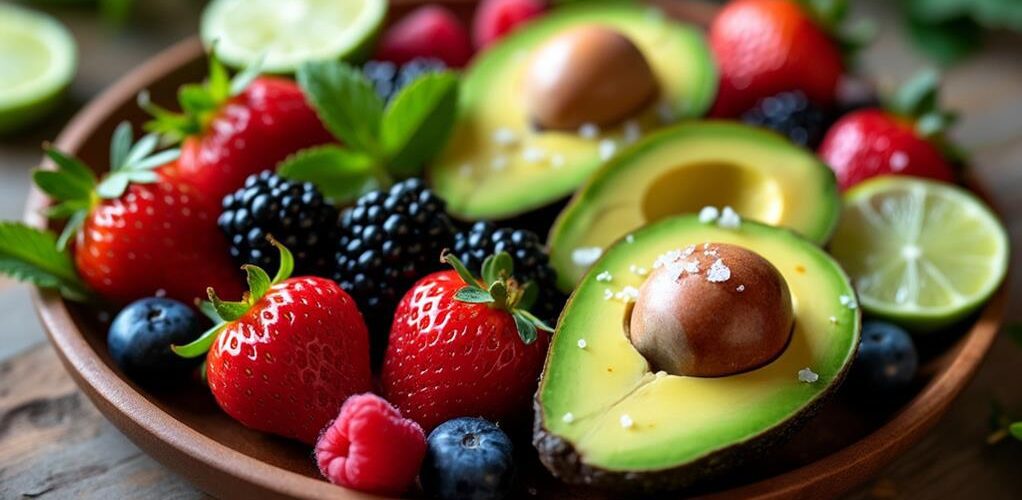
Avocados are exemplary keto-friendly fruits, with their low net carbohydrate content (~2.8g per 100g) and high monounsaturated fats, benefiting cardiovascular health. Strawberries and raspberries also fit well, providing antioxidants, low glycemic indices, and fiber content that aids digestion, with net carbs of ~8.7g and ~7g per cup, respectively. Lemons, offering ~3g of carbs per fruit, infuse vitamin C and flavor into dishes without disrupting ketosis. Tomatoes, rich in lycopene and low in carbs (~3.3g per cup), contribute to immune health. These fruits offer both nutritional benefits and culinary flexibility, essential insights to further enhance your keto journey.
Key Takeaways
- Avocados are low in net carbs and high in healthy fats, making them excellent for keto diets.
- Strawberries offer a low glycemic index and are rich in vitamin C, ideal for keto-friendly desserts.
- Raspberries provide low net carbs and high fiber, supporting digestion and ketosis.
- Lemons are low-carb and enhance flavors in keto recipes, offering a vitamin C boost.
- Tomatoes deliver minimal net carbs and are rich in antioxidants, suitable for various keto dishes.
Avocados
Avocados are a quintessential component of the ketogenic diet owing to their low net carbohydrate content, approximately 2.8 grams per 100-gram serving, which aligns seamlessly with the diet's macronutrient requirements. Their high monounsaturated fat content, approximately 15 grams per serving, provides substantial avocado benefits, particularly for cardiovascular health, by promoting favorable lipid profiles.
Additionally, the nutrient density of avocados makes them an excellent source of essential vitamins and minerals, enhancing overall health. The substantial fiber content, nearly 7 grams per serving, enhances digestive health and aids in glycemic control, both critical for individuals adhering to a ketogenic lifestyle.
From a nutritional perspective, avocados are replete with essential micronutrients. They provide significant amounts of vitamin K, covering approximately 26% of the daily value, and are rich in folate and potassium, offering around 485 mg per avocado. These nutrients play pivotal roles in bone health, cellular function, and electrolyte balance, respectively.
Avocado recipes abound in the ketogenic culinary repertoire, ranging from delicious salads and savory spreads to nutrient-dense smoothies. These versatile options not only augment flavor but also bolster the nutritional profile of meals, enhancing satiety without compromising carbohydrate intake.
Consequently, avocados are an invaluable addition to a balanced ketogenic diet, harmonizing taste with health benefits.
Strawberries
While avocados stand out as a staple in the ketogenic diet due to their favorable macronutrient profile, strawberries offer a sweet yet surprisingly compatible alternative for those following this low-carbohydrate regimen. With approximately 11.7 grams of carbohydrates and 3 grams of fiber per 1-cup serving, strawberries yield a net carb count of 8.7 grams, making them a suitable choice for keto adherents. Their low glycemic index guarantees minimal impact on blood glucose, a critical consideration for maintaining ketosis.
Furthermore, strawberries can be a part of a cognitive enhancement routine, as their antioxidants support brain health. Rich in vitamin C, strawberries provide about 149% of the Daily Value in a single serving, supporting immune function and skin health. Additionally, their high antioxidant content, including anthocyanins, contributes to anti-inflammatory effects and potential heart health benefits.
This nutritional profile positions strawberries as a means to enhance satiety and diversify keto-friendly meals. Incorporating strawberries into one's diet can be achieved through various culinary applications. Strawberry smoothies, for instance, can offer a revitalizing, nutrient-dense beverage option, while strawberry desserts can satisfy a sweet tooth without compromising ketosis.
Ultimately, strawberries are a versatile and nutritious addition to a ketogenic diet, providing flavor and health benefits in equal measure.
Raspberries
Raspberries, with their approximately 7 grams of net carbohydrates per 1-cup serving, present an excellent low-carb option for individuals adhering to a ketogenic diet. Their rich dietary fiber content, approximately 8 grams per cup, not only aids digestion but also contributes to a reduced net carbohydrate intake. This makes raspberries a suitable choice for those seeking to maintain ketosis while enjoying the nutritional benefits of fruits.
Additionally, the ketogenic diet can notably lower blood glucose levels and improve insulin sensitivity, making raspberries a beneficial fruit choice within this dietary plan.
Raspberries offer numerous health advantages, largely due to their high antioxidant levels, particularly ellagic acid. This compound is associated with anti-inflammatory properties and potential cardiovascular benefits, which can be a considerable asset for individuals focusing on long-term health.
Additionally, the presence of essential vitamins and minerals, such as vitamin C, manganese, and vitamin K, supports immune function and overall health.
The low glycemic index of raspberries further enhances their suitability for a ketogenic diet by helping to maintain stable blood glucose levels. This factor is essential for those managing their carbohydrate intake meticulously.
- Raspberry recipes can enhance a keto diet with creativity and flavor.
- Raspberry benefits include antioxidant and anti-inflammatory effects.
- High fiber content aids digestion and reduces net carbs.
- Essential nutrients support immune health and well-being.
Lemons
In the domain of keto-friendly fruits, lemons emerge as a versatile choice that harmonizes flavor with dietary goals. With approximately 3g of carbohydrates per fruit, lemons offer a low-carb option that aligns seamlessly with the ketogenic diet. Rich in vitamin C, they provide about 51% of the daily value per lemon, supporting immune function and skin health, which are essential aspects of overall wellness. The fiber in lemons, primarily pectin, plays a significant role in stabilizing blood sugar levels and promoting digestive health, further enhancing their nutritional profile.
| Nutrient | Content per Lemon |
|---|---|
| Carbohydrates | 3g |
| Vitamin C | 51% Daily Value |
| Calories | 11 |
From a practical standpoint, lemon benefits extend to their culinary applications. They are low in calories, with a medium-sized lemon containing around 11 calories, making them an excellent flavor enhancer without adding significant carbohydrates. Incorporating lemon juice in dressings or beverages can uplift dishes while maintaining minimal carb intake, a boon for keto enthusiasts. Lemon recipes are diverse, ranging from invigorating drinks to zesty marinades, showcasing their adaptability in keto culinary practices. Such versatility underscores lemons as a nutritionally beneficial and flavorful addition to a ketogenic lifestyle.
Tomatoes
Among the array of keto-friendly fruits, tomatoes stand out due to their unique nutritional profile and culinary versatility. Technically classified as a fruit, tomatoes contain approximately 4.8 grams of carbohydrates and 1.5 grams of fiber per cup, leading to a manageable 3.3 grams of net carbs. This low carbohydrate content makes them a suitable option for those adhering to a ketogenic diet.
Rich in vitamins A and C, tomatoes provide essential nutrients that bolster immune health and maintain skin integrity. Additionally, tomatoes are low in calories, similar to non-starchy vegetables, making them an excellent choice for weight management on a keto diet.
The health benefits of tomatoes extend further due to their significant lycopene content, an antioxidant associated with a reduced risk of heart disease and certain cancers. Their high water content contributes to hydration and makes them low in calories, thereby promoting weight management without compromising on nutritional value.
Tomatoes can be seamlessly incorporated into various culinary dishes, offering both flavor and health benefits without exceeding carbohydrate limits. Their versatility is reflected in their ability to enhance:
- Salads
- Sauces
- Salsas
- Soups
Different tomato varieties, such as cherry, plum, and beefsteak, allow for creative culinary applications, thereby enhancing the dietary experience for individuals committed to a keto lifestyle.
Frequently Asked Questions
What Are the Best Fruits for Keto Diet?
When considering the best fruits for a keto diet, avocados, raspberries, strawberries, lemons, and tomatoes stand out. Their low net carb content makes them ideal for keto fruit smoothies and low carb fruit recipes, supporting metabolic ketosis.
Can I Eat Fruit on Keto and Still Lose Weight?
Yes, you can consume fruit on a keto diet and achieve weight loss by selecting keto fruit options with low net carbohydrates. Implementing strategic portion control and emphasizing nutrient density are essential weight loss strategies within this dietary framework.
How Many Fruits a Day on Keto?
On a ketogenic diet, limiting keto fruit portions to 1-2 servings daily is essential. Opt for low-carb snacks like berries or avocados, ensuring total carbohydrate intake remains within 20-50 grams net carbs for effective ketosis maintenance.
What Is the Most Carb Friendly Fruit?
The most carb-friendly fruit is the avocado, with only 2.8 grams of net carbs per 100 grams. Its low carbohydrate content and high fiber make it ideal for keto fruit smoothies, alongside other low-carb berries like raspberries.
Conclusion
To summarize, incorporating keto-friendly fruits such as avocados, strawberries, raspberries, lemons, and tomatoes into a ketogenic diet offers numerous health benefits while maintaining low carbohydrate intake. These fruits provide essential nutrients, including vitamins, minerals, and antioxidants, which support overall health and metabolic functions. Their low glycemic index and high fiber content contribute to stable blood sugar levels, making them suitable for those adhering to a ketogenic lifestyle. Future research may further elucidate their specific roles in metabolic health and disease prevention.









No Comments